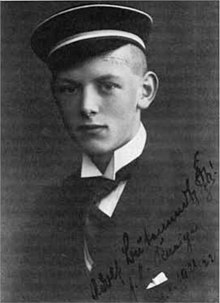Adolf Butenandt | |
|---|---|
 Adolf Friedrich Johann Butenandt in 1921 | |
| Born | 24 March 1903 |
| Died | 18 January 1995 (aged 91) Munich, Germany |
| Nationality | German |
| Awards | Nobel Prize for Chemistry (1939) Kriegsverdienstkreuz (1942) |
| Scientific career | |
| Fields | Organic and biochemistry |
| Institutions | Kaiser Wilhelm Institute / Max Planck Institute for Biochemistry Technical University of Danzig |
| Thesis | Untersuchungen über das Rotenon, den physiologisch wirksamen Bestandteil der Derris elliptica (1928) |
| Doctoral advisor | Adolf Windaus |
Adolf Friedrich Johann Butenandt (German pronunciation: [ˈaːdɔlf ˈbuːtənant] ; 24 March 1903 – 18 January 1995) was a German biochemist.[1] He was awarded the Nobel Prize in Chemistry in 1939 for his "work on sex hormones." He initially rejected the award in accordance with government policy, but accepted it in 1949 after World War II.[1][2][3][4] He was President of the Max Planck Society from 1960 to 1972. He was also the first, in 1959, to discover the structure of the sex pheromone of silkworms, which he named bombykol.
- ^ a b Szöllösi-Janze, Margit (2001). Science in the Third Reich (German Historical Perspectives). Oxford, UK: Berg Publishers. ISBN 1-85973-421-9.
- ^ Akhtar, M.; Akhtar, M. E. (1998). "Adolf Friedrich Johann Butenandt. 24 March 1903-18 January 1995". Biographical Memoirs of Fellows of the Royal Society. 44: 79–92. doi:10.1098/rsbm.1998.0006. PMID 11623990.
- ^ Karlson, P. (1995). "Adolf Butenandt (1903–1995)". Nature. 373 (6516): 660. Bibcode:1995Natur.373..660K. doi:10.1038/373660b0. PMID 7854440. S2CID 4349895.
- ^ Jaenicke, L. (1995). "Adolf Butenandt: 24. 3. 1903 - 18. 1. 1995". Chemie in unserer Zeit. 29 (3): 163–165. doi:10.1002/ciuz.19950290313.